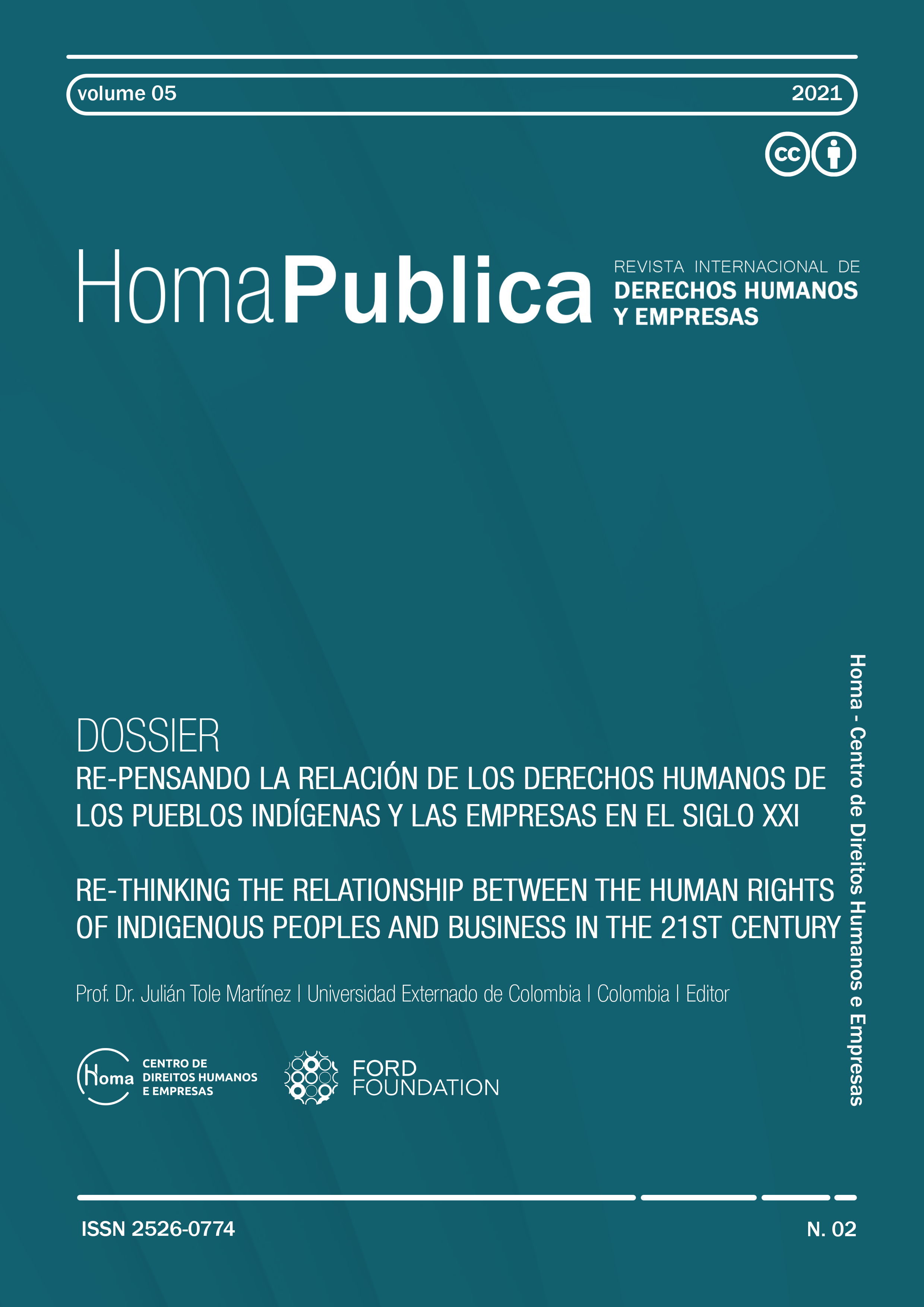Publicado 2021-12-21
Palabras clave
- descolonialidad,
- pueblos indígenas,
- derechos humanos,
- Colonialidad,
- Teoría crítica latinoamericana
Cómo citar
Derechos de autor 2021 Homa Publica - Revista Internacional de Derechos Humanos y Empresas

Esta obra está bajo una licencia internacional Creative Commons Atribución 4.0.
Resumen
El presente texto tiene como finalidad exponer la viabilidad de la Teoría Crítica como herramienta doctrinal desconceptualizante de DDHH desde Nuestra América, de manera que sea factible evidenciar la insuficiencia de los DDHH concebidos únicamente con una raíz europea, empresarial y la afectación que trae consigo en comunidades dispares en su praxis a una visión hegemónica, como son los pueblos indígenas; grupos que abundan en diversidad dentro de nuestro territorio latinoamericano. Esta teoría es una herramienta fundamental para lograr respaldar la noción de derechos humanos contextualizados, permeando en ellos la realidad latinoamericana y las necesidades características de dicha pluralidad en los derechos humanos. Cuestionar las bases epistemológicas que producen la ciencia jurídica es, por mucho, el deber de una teoría crítica o una crítica jurídica, además de exponer la obligación del rompimiento epistemológico a partir del análisis social de tiempo, espacio geográfico, ideología política, sublevaciones sociales, etc., permitiendo que la construcción del derecho sea a partir de las necesidades sociales, contrario a una noción empresarial e individualista de los DDHH de corte occidental que no comprende la dinámica social latinoamericana y despersonalizan toda una región. Se propugna por un abordaje alternativo que garantice la progresividad de los derechos humanos.
Descargas
Citas
- Aguilar, M. (1998). “Las tres generaciones de los derechos humanos”, Derechos Humanos. Órgano informativo de la Comisión de Derechos Humanos del Estado de México, Biblioteca Jurídica UNAM, (30). Versión digital en https://revistas-colaboracion.juridicas.unam.mx/index.php/derechos-humanos-emx/article/view/5117/4490
- Cerutti, H. G. (1999). Perspectivas y nuevos horizontes para las ciencias sociales en América Latina En: Maerk, J. & Cabrolié, M. (coordinadores) (1999). ¿Existe una epistemología latinoamericana?. [s.l.]: Plaza Valdez editores y Universidad de Quintana Roo.
- Dussel, E. (1996). Filosofía de la liberación, Bogotá, Nueva América. Versión digital en http://biblioteca.clacso.edu.ar/clacso/otros/20120227024607/filosofia.pdf
- Ellacuría, I. (1993). Función liberadora de la filosofía. En: Veinte años de historia en El Salvador (1969-1989). Escritos políticos, Tomo I, San Salvador: UCA Editores.
- Espinoza, G. (2011). Feminismo Popular, Tensiones e Intersecciones entre el Género y la Clase. En: Un fantasma recorre el siglo luchas feministas en México 1910-2010. 2a edición. México DF: UAM-X, CSH, Depto. De Relaciones Sociales. Versión digital en http://bidi.xoc.uam.mx/tabla_contenido_libro.php?id_libro=394
- Gallardo, H. (2008). Teoría crítica: matriz y posibilidad de los derechos humanos. Murcia: ed. Sánchez Rubio.
- Hernández, J. L. (2009). Modernidad/Colonialidad/Descolonialidad, en Pacarina del Sur. Revista de pensamiento crítico latinoamericano, (1). Se puede consultar en http://www.pacarinadelsur.com/images/stories/pdf/modernidad.pdf
- Quijano, A. (2014). Colonialidad del poder, eurocentrismo y América Latina. Buenos Aires: CLACSO. Versión digital en http://biblioteca.clacso.edu.ar/clacso/se/20140507042402/eje38.pdf
- Rosillo, A. (2016). Repensar derechos humanos desde la liberación y la descolonialidad. Revista Direito e Práxis, 7 (13). pp. 721-749. Versión digital en https://www.redalyc.org/pdf/3509/350944882023.pdf
- Sánchez, D. (2004). Crítica a Una Cultura Estática y Anestesiada De Derechos Humanos. Por Una Recuperación De Las Dimensiones Constituyentes De La Lucha Por Los Derechos. Universidad de Sevilla.
- Santos, B. de S. (2011). “Epistemologías del Sur”, Utopía y Praxis Latinoamericana en Revista Internacional de Filosofía Iberoamericana y Teoría Social, 16 (54).
- Scannone, J. C. (2009). La filosofía de la liberación: historia, características, vigencia actual. Teología y vida, 50.
- Wolkmer, A. C. (2006). Introducción al pensamiento jurídico crítico. 3ª ed. San Luis Potosí: ILSA-CEDH Facultad de Derecho UASLP.

